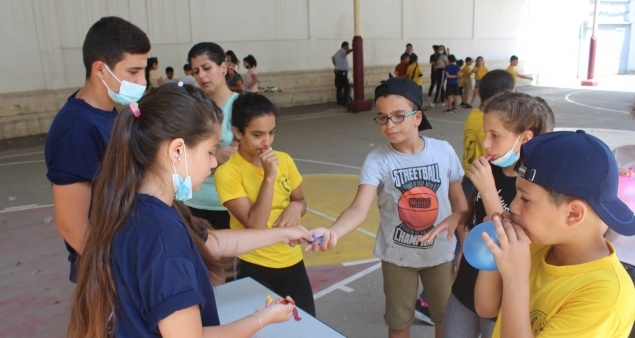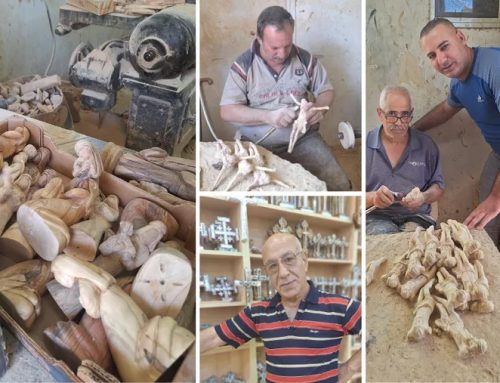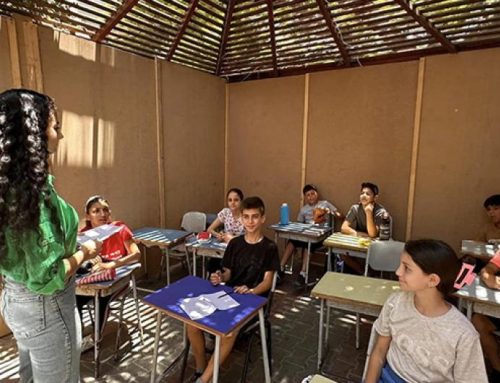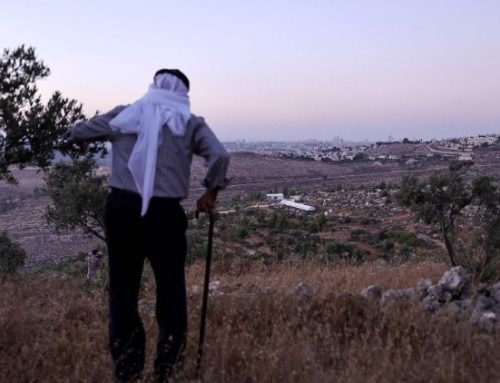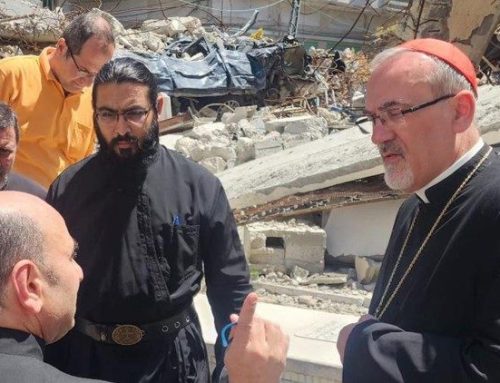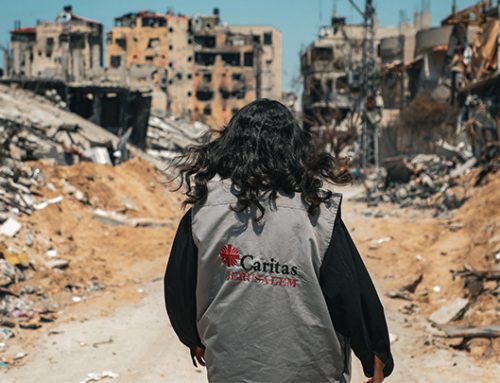HOLY LAND – After one-year hiatus due to the outbreak of the Coronavirus in the Holy Land, and with the support of the Latin Patriarchate of Jerusalem, the various parishes of the Patriarchate in Jerusalem, the West Bank and the Gaza Strip this year, organized summer camps for their children while following the appropriate preventive measures.
In Jifna, the parish of St. Joseph organized this year a summer camp entitled “Jesus Loves Me” for children from kindergarten to eighth grade, from July 2 to August 8, 2021. This year, the camp focused on spiritual scriptures that reveal Christ’s love for His children. It also included other activities such as music, Dabkeh, Zumba, cooking, kung fu, and various handicrafts including clay and mosaic. The camp also included a meeting about bullying and love, as well as weekly trips to the swimming pools.
At the end of the camp, which was prepared by Fr. Johnny Bahbah, parish priest of Jifna, and Deacon Malek Hijazeen, with the help of seven young volunteers, a closing ceremony was organized in the village to showcase all the skills the children had learned during the camp days.
Fr. Johnny Bahbah said: “This year, the camp witnessed a huge presence, as the number of participating children reached 117, compared to 94 children two years ago. Some parents registered their children in the summer camp this year for the first time, in order to encourage them to leave the house and release pressure. This year, I felt a thirst for returning to Church after a year of no activity.” He added: “It is necessary for children to gather in the Church and learn about its teachings, in order to feel its presence in their lives, their closeness to it, and the necessity of perseverance in this land which needs them.”
In the parish of the Holy Family in Gaza, its Parish vicar Fr. Yousef Asa’ad, with the help of the Sisters of the Incarnate Word and several volunteers, organized summer camps for parishioners between the ages of 3 and 16, between April 28 and July 30. The number of participating children ranged between 150 and 200, despite the fear of parents and camp organizers alike of the spread of the virus in the Strip, which is under siege and witnesses a scarcity of medical resources and supplies. The organizers made sure children kept their masks on, changing them once every three hours and keeping a safe distance between them.
The camp which was entitled “Let the little children come to me and do not hinder them”, focused on the necessity of attending Mass and religious lessons for the sake of spiritual growth, by helping the children memorize verses from the Bible, learn new hymns, and perform various activities such as Dabkeh, handicrafts, football, basketball, among other things. And in order to encourage children, competitions were organized and prizes were distributed at the end of each day, in addition to organizing weekly trips to swimming pools.
Mrs. Nisreen Anton, General Projects Manager at the Holy Family parish in Gaza, explained that “the importance of organizing the summer camp this year stems from the need to support children and help them release their energies, through sports and religious and recreational activities, especially following the outbreak of the virus and the recent war on Gaza, which led to the deterioration of mental health of both the children and camp organizers.”
In St. James Vicariate for the Hebrew Speaking Community, one summer camp was organized this year for older children, due to the complexity of the safety procedures imposed by the Israeli government on children, such as the requirements to conduct tests every two days. About 50 children from Jerusalem, Haifa and Tel Aviv participated in the camp organized in Deir Rafat this year, from August 9-13.
This year’s camp was entitled “The Book of Ruth”, and included activities such as dancing, singing, acting and making costumes and religious lectures related to the Book of Ruth. This book was specifically chosen in an attempt to bring stories from the Holy Book closer to the lives of Hebrew-speaking children and youth from migrant families, since Ruth was also a migrant. At the end of the camp, the children performed a musical about the Book of Ruth, inspired by the musical “Desert Flower” performed by the Hebrew-speaking youth during their trip to Austria under the auspices of the Austrian organization KISI (God’s Singing Kids) and funded by Erasmus+ program of the European Union.
“The importance of the summer camps in the Vicariate is that the children here live in a Jewish community and do not meet many Christians,” says Dimitry, a member of the Hebrew-speaking Catholic community. “That is why this experience is necessary for them, as they gather from all over the country to get to know each other and talk about our common Christian faith. It’s a reminder to them that they are not alone, that they belong somewhere, and that they are part of it. It is also a chance to get to know their faith and the Church better. It is food for their souls for the rest of the year.”
The General Secretariat of The Youth of Jesus’ Homeland in Palestine, had set up two summer camps for the working and university youth at the Cremisan Monastery in Beit Jala. The 4-day camp for the Worker’s Group was entitled Halla La Wain “and now where to?”, with the participation of more than 70 young men and women from all the parishes of Jesus’ homeland. During the camp, several lectures were held, including two lectures entitled “Our History in Palestine”, and “A Rebel and a Christian”. Various topics such as abortion, premarital sexual relations, uterine lending, embryo implantation and gender determination, euthanasia, organ donation, bullying, competition, gossip and laziness were also discussed, by dividing the participants into several groups.
The University Group camp on the other hand was entitled “My Faith x7”, which means “I am a believer and a disciple”. It dealt with various topics, focusing on the seven sacraments, including “Marriage and The Christian Family”, “The Priest and The Eucharist”, as well as a meeting about the sacrament of confession, and a small play entitled “Revival”. The two summer camps also featured various competitive and recreational games.
The majority of the Latin Patriarchate parishes conduct summer camps every year, in order to provide the children and youth with the opportunity to experience and discover new or emerging interests, and to focus on special skills and interests that may be set aside or neglected during the academic year. The summer programs allow the children and youth to participate in various activities and live new experiences in drama, arts, religion, music, voluntary work, as well as community and social services. More than 6000 children and youth from the different parishes participate in the yearly summer camps that are led by priests and lay educators.
Source: lpj.org

